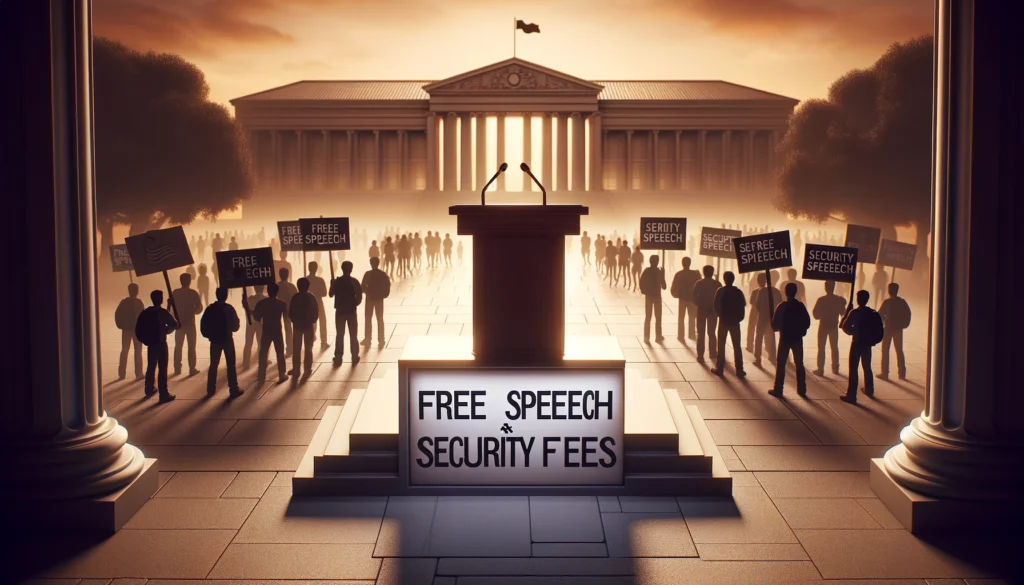In a recent turn of events, the University of Wisconsin-Madison canceled their plans to charge a conservative group, Young Americans for Freedom (YAF), a “security” fee for their scheduled event featuring Daily Wire host Michael Knowles. The decision, made in response to the potential legal challenges it triggered, highlights an escalating tension between academic institutions and conservatives, frequently claiming their rights under the First Amendment are being violated.
Prior to the scheduled talk by Knowles, college administrators conveyed to YAF their obligation to defray the costs of security measures, including six police officers, a metal detector, and additional precautions amounting to $4,271.17. Furthermore, the bill incorporated a seemingly misapplied “sales tax”. The university did not respond to a request for an explanation from The Daily Wire before reversing their decision amidst growing allegations that these fees were “unlawful”.
The Wisconsin Institute for Law and Liberty (WILL) and the Mountain States Legal Foundation raised their voice against such an unconventional charge, pointing out that no student group has been imposed “security” fee for hosting speakers previously. They argued that the charges were illegal, stemming from a “risk assessment worksheet” which indicated “significant security/safety problems at event sponsor events (in last 2 years)”.
One such instance of security issues was the extensive vandalism by left-wing protestors when YAF hosted another Daily Wire host, Matt Walsh, the previous year. The university police, despite having visual evidence, chose not to prosecute the culprits or release related public records to YAF. This stirred an outcry, with many interpreting this charge as a way of penalizing conservatives for the crime committed to suppress them, implying that the University was indirectly promoting left-wing crimes.
On Monday afternoon, the University backed down from placing the ‘security’ charge against YAF, without acknowledging any lapse of judgment or outlining future reforms. Nancy Lynch, UW-Madison’s vice chancellor for legal affairs, stated the charges related to security protocols were removed to ensure that the event moved forward within the tight timeframe.
Interestingly, the University did not charge YAF for similar past events featuring Walsh and Daily Wire co-founder Ben Shapiro, nor for speeches by left-wing speakers such as the controversial Bradley Manning and Sen. Elizabeth Warren (D-MA). Even Nikole Hannah-Jones, author of the contentious 1619 Project, was not only exempt from security charges but also paid $55,000.
YAF’s legal advisers issued a warning to the University’s stakeholders, stating they could be held personally accountable for infringements of constitutional rights. They stressed that charging a conservative group thousands for hosting a so-called ‘controversial’ speaker was absurd, highlighting cases where the university freely hosted and even paid for speakers with controversial left-leaning views.
Ironically, Michael Knowles—the speaker in the heart of this controversy—penned a book titled “Speechless” which focuses on censorship. His planned talk in Madison is titled “The Case Against Murder” and champions pro-life stances.
“Freedom of speech is not negotiable,” stated Dan Lennington, Deputy Counsel for WILL, emphasizing that UW-Madison should encourage a diversity of viewpoints and a vigorous exchange of ideas. As a public institution that claims to regard freedom of expression as fundamental to its educational mission, UW-Madison seems to be straining the bounds of the very First Amendment it purports to uphold.
In conclusion, these experiences compel us to reevaluate our understanding of freedom of speech in America’s educational institutions. They spotlight the critical need to safeguard the First Amendment rights of all students, no matter where on the political spectrum their views lie. This incident at the University of Wisconsin serves as a stark reminder of the ongoing struggle to preserve intellectual diversity within our colleges, and the need for administrators to remain unbiased gatekeepers to maintaining a robust marketplace of ideas on campuses nationwide, a cornerstone of the quintessential American higher-education experience.



